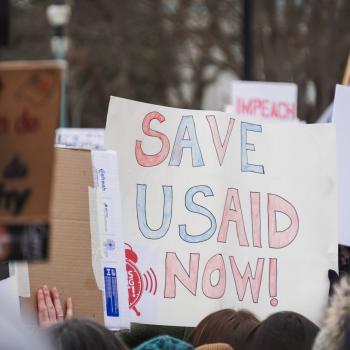Editors' Note: This article is part of a Public Square conversation on Interfaith Dialogue. Read other perspectives here.
One of my closest interfaith pals has often said to me, "I'm eager for us to get past the 'tea party conversation' and really talk about things like how we are different, not just how we are alike." Indeed. Fine china and lace are great for a tea party (the old-fashioned kind, not political), the genteel murmurings of mutual affirmation. But what happens when you spill your tea or someone has an allergic reaction to your beautiful gateau?
I was quite troubled a few years ago when I read the sacred text of a major religion and found that I really disliked it. All my life I'd had this idea that I would find inspiration in all holy books if I took the time. Wrong! Not only was I not inspired, but I was really turned off. Since I have several friends in this faith, I very much wanted to be able to reconcile my distaste with their dedication and devotion. But how to have such a potentially-inflammatory discussion? Sacred texts are, by their nature, held to be something more than books, holy in and of themselves and worthy of respect. Most people are upset by the idea of carelessly handling or damaging a Bible or a Quran, for example. How could I uphold my interfaith values but be honest?
There is an art to agreeing to disagree. First, as my husband tells me, everyone doesn't have to know all your business. I refrained from rushing out to ask my friends, why do you prize these words that make me so uncomfortable? I had to be patient with my disquiet. About six months later I found myself traveling with one of these friends, who is always telling me, "Holli, you can ask me anything." When she said that again during this trip, I took a deep breath and jumped in. I salute my friend for neither being offended in the slightest (that I could see), nor for wavering from her faith. She shared some simple but priceless personal thoughts that were just what I needed. They also provided me with a new window of insight into that religion, allowing me to value it with a sincerity I did not really possess before.
What made it possible for us to have this beefsteak conversation? I believe it was because we have done lots of tea parties together before this. We took the time to be around each other, have the easy conversations, and learn to trust each other. It did not happen overnight and, to be fair, my friend is an extraordinary person, a fine ambassador for her religion. But it happened, and I am the better person for it, and I think that makes the world more peaceful by at least a micrometer.
This is a call to Pagans to recognize interfaith engagement as deserving of your attention and effort. For too long we have preferred the perceived safety of isolation. We assume that because some people will attempt to restrict our civil rights that we should avoid everyone. And then we wonder why we are misunderstood! This is a childish response to the possibility of rejection. Just as civic participation is critical for a democracy to succeed, so is interfaith engagement necessary for us to cultivate a healthy religiously plural society. To those who claim they have no interest in or need to "do interfaith," I say, just wait until you need support. For now, we are too invisible for anyone to bother, but the day will come here in my Bible-belt city when extremists will finally see Pagans as a threat. When that time comes, Pagans now have strong allies at all levels of virtually every religion in the state, including bishops, priests, and rank and file, each with their particular kind of clout. I am proud to stand with them, and I know they will be there for me.
I can see so many people's eyes glaze over when I invite them to attend something interfaith with me. Another discussion group? Another world religions class? No thank you, I see in their faces. How can I convey to them the ineffable joys of getting to know people who are completely outside our usual personal circles?
Interfaith involvement is a not-sexy label for a process that grows unplanned but beautiful gardens. It has been uncomfortable at times for me; I joke about being the "token Pagan" though truth is I'm heavily involved in board work [http://interfaithpartnersofsc.org/]. I've cried some bitter tears, and expect there will be periodic difficulties. That's human nature; growing stuff is hard work. But now I have a whole garden in which I can walk any time I wish, meeting my Mormon and Muslim and Methodist friends on our bridge over the lovely water of spirit that nourishes all of us.
2/12/2014 5:00:00 AM




